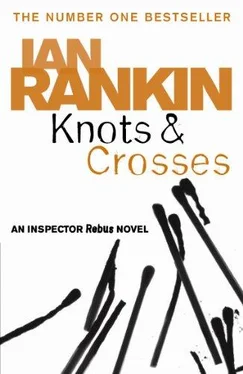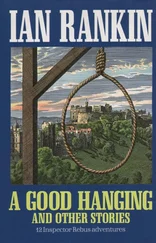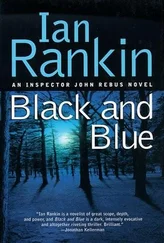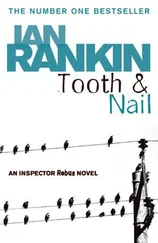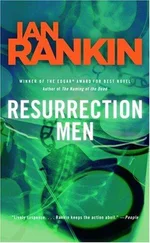Michael sat up in his chair.
‘You can’t remember what exactly?’
‘Something. I don’t know. Just something. If I knew what, I would remember, wouldn’t I? But there’s a gap. I know there is. I know that there’s something I should remember.’
‘Something from your past?’ Michael was keening now. Perhaps this had nothing at all to do with himself. Perhaps it was all to do with something else, someone else. He grew hopeful.
‘From the past, yes. But I can’t remember.’ Rebus rubbed his forehead as though it were a crystal ball. Michael was fumbling in his pocket.
‘I can help you to remember, John.’
‘How?’
‘Like this.’ Michael was holding, between thumb and forefinger, a silver coin. ‘You remember what I told you, John. I take my patients back into past lives every day. It should be easy enough to take you back into your real past.’
It was John Rebus’s turn to sit up. He shook away the whisky fumes.
‘Come on then,’ he said. ‘What do I do?’ But inside part of him was saying: you don’t want this, you don’t want to know.
He wanted to know.
Michael came over to his chair.
‘Lie back in the chair. Get comfortable. Don’t touch any more of that whisky. But remember, not everyone is susceptible to hypnotism. Don’t force yourself. Don’t try too hard. If it’s going to come, it’ll come whether you will it or not. Just relax, John, relax.’
The doorbell rang.
‘Ignore it,’ said Rebus, but Michael had already left the room. There were voices in the hall, and when Michael reappeared he was followed into the room by Gill.
‘The telephone caller, it seems,’ said Michael.
‘How are you, John?’ Her face was angled into a portrait of concern.
‘Fine, Gill. Listen, this is my brother Michael. The hypnotist. He’s going to put me under — that’s what you called it, wasn’t it, Mickey? — to remove whatever block there might be in my memory. Maybe you should be ready to take some notes or something.’
Gill looked from one brother to the other, feeling a little out of things. An interesting pair of brothers. That’s what Jim Stevens had said. She had been working for sixteen hours, and now this. But she smiled and shrugged her shoulders.
‘Can a girl get a drink first?’
It was John Rebus’s turn to smile. ‘Help yourself,’ he said. ‘There’s whisky or whisky and water or water. Come on, Mickey. Let’s get on with this. Sammy’s out there somewhere. There might still be time.’
Michael spread his legs a little, leaning down over Rebus. He seemed to be about to consume his brother, his eyes close to Rebus’s eyes, his mouth working in a mirror-image. That’s what it looked like to Gill, pouring whisky into a tumbler. Michael held up the coin, trying to find the angle of the room’s single low-wattage bulb. Finally, the glint was reflected in John’s retina, the pupils expanding and contracting. Michael felt sure that his brother would be amenable. He certainly hoped so.
‘Listen carefully, John. Listen to my voice. Watch the coin, John. Watch it shine and spin. See it spinning. Can you see it spinning, John? Now relax, just listen to me. And watch the spin, watch it glow.’
For a moment it seemed that Rebus would not go under. Perhaps it was the familial tie that was making him immune to the voice, to its suggestive power. But then Michael saw the eyes change a little, imperceptibly to the uninitiated. But he was initiated. His father had taught him well. His brother was in the limbo world now, caught in the coin’s light, transported to wherever Michael wanted him to go. Under his power. As ever, Michael felt a little shiver run through him: this was power, power total and irreducible. He could do anything with his patients, anything.
‘Michael,’ whispered Gill, ‘ask him why he left the Army.’
Michael swallowed, lining his throat with saliva. Yes, that was a good question. One he had wanted to ask John himself.
‘John?’ he said. ‘John? Why did you leave the Army, John? What happened, John? Why did you leave the Army? Tell us.’
And slowly, as though learning to use words strange or unknown to him, Rebus began to tell his story. Gill rushed to her bag for a pen and a notepad. Michael sipped his whisky.
They listened.
I had been in the Parachute Regiment since the age of eighteen. But then I decided to try for the Special Air Service. Why did I do that? Why will any soldier take a cut in pay to join the SAS? I can’t answer that. All I know now is that I found myself in Herefordshire, at the SAS’s training camp. I called it The Cross because I’d been told that they would try to crucify me, and there, along with the other volunteers, I went through hell, marching, training, testing, pushing. They took us to the breaking point. They taught us to be lethal.
At that time there were rumours of an imminent civil war in Ulster, of the SAS being used to root out insurrectionists. The day came for us to be badged. We were given new berets and cap-badges. We were in the SAS. But there was more. Gordon Reeve and myself were called into the Boss’s office and told that we had been judged the two best trainees of the batch. There was a two-year training period in front of us before we could become regulars, but great things were predicted for us.
Later, Reeve spoke to me as we left the building.
‘Listen,’ he said, ‘I’ve heard a few of the rumours. I’ve heard the officers talking. They’ve got plans for us, Johnny. Plans. Mark my words.’
Weeks later, we were put on a survival course, hunted by other regiments, who if they captured us would stop at nothing to prise from us information about our mission. We had to trap and hunt our food, lying low and travelling across bleak moorland by night. We seemed destined to go through these tests together, though on this occasion we were working with two others.
‘They’ve got something special lined up for us,’ Reeve kept saying. ‘I can feel it in my bones.’
Lying in our bivouac, we had just slipped into our sleeping-bags for a two-hour nap when our guard put his nose into the shelter.
‘I don’t know how to tell you this,’ he said, and then there were lights and guns everywhere, and we were half-beaten into unconsciousness as the shelter was ripped open. Foreign tongues clacked at us, their faces masked behind the torches. A rifle-butt to the kidneys told me that this was for real. For real.
The cell into which I was thrown was real enough, too. The cell into which I was thrown was smeared with blood, faeces, and other things. It contained a stinking mattress and a cockroach. That was all. I lay down on the damp mattress and tried to sleep, for I knew that sleep would be the first thing to be stripped from us all.
The bright lights of the cell came on suddenly and stayed on, burning into my skull. Then the noises started, noises of a beating and a questioning taking place in the cell next to me.
‘Leave him alone, you bastards! I’ll tear your fucking heads off!’
I slammed at the wall with fists and boots, and the noises stopped. A cell door slammed shut, a body was dragged past my metal door, there was silence. I knew my time would come.
I waited there, waited for hours and days, hungry, thirsty, and every time I closed my eyes a sound like that of a blaring radio caught between stations would sound from the walls and the ceiling. I lay with my hands over my ears.
Fuck you, fuck you, fuck you.
I was supposed to crack now, and if I cracked I would have failed everything, all the months of training. So I sang tunes loudly to myself. I scraped my nails across the walls of the cell, walls wet with fungus, and scratched my name there as an anagram: BRUSE. I played games in my head, thought up crossword-puzzle clues and little linguistic tricks. I turned survival into a game. A game, a game, a game. I had to keep reminding myself that, no matter how bad things seemed to be getting, this was all a game.
Читать дальше
